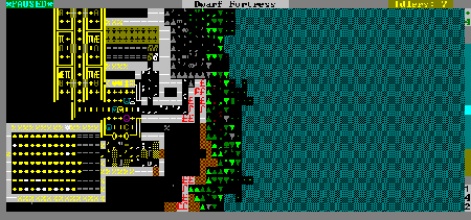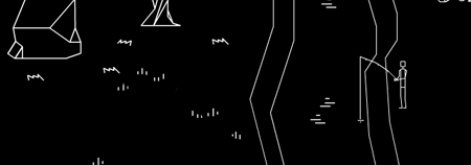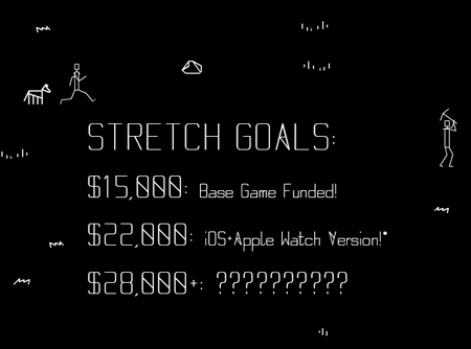Peopletime is a real-time civilization simulator rooted in the emergent narratives of games like Dwarf Fortress, and the light-hearted, unexpected humor of games such as Tomodachi Life.
It's an ambitious, and surprisingly deep game, especially for its target platform: smartwatches.
While developer Cass Carpendale aims to bring Peopletime to mobile devices as well, it's clear he's thought good and hard about the unique approach to game design that a wearable experience necessitates.
Carpendale and I discussed some of these approaches below, including ways to make game worlds feel alive and independent, even without constant player engagement, and how simple interactions can be made to feel massive with just the right amount of tinkering.
Peopletime is currently on Kickstarter for the next two weeks, and needs $15,000 to reach its funding goal.
PocketGamer: You list Dwarf Fortress, Tomodachi Life, and "others" as your inspirations. Could you talk more about which elements from these two games influenced Peopletime the most, and what these other, mysterious inspirations are?
Cass Carpendale: I think a lot of the things that make Dwarf Fortress seem almost magical aren't even intentional. It feels like there's an incredible amount of content simply in terms ways to interact because you're going to spend your first few sessions just getting comfortable with even the most basic commands.
Some feel almost hidden. I know people who have spent a long time playing that game and still have left parts of it completely untouched simply because that section is foreign to them.
I think that that being a result of an overly complicated interface is obviously a flaw - but that doesn't mean we can't learn something from it. What does that look like when it's done on purpose? I'd say that flaw probably had the biggest influence on the way my game works.

In Peopletime I'm trying to have the same effect by doing exactly the opposite thing. You have an incredibly simple, context-sensitive interface. As your people learn or become aware of things, new options will appear. You can also use commands to create certain scenarios that will make other commands have a different result given the context.
"Find Meat" looks completely different if you just started than if you're running a successful cattle farm. (Although you can go "deeper" on many of these options with an additional swipe - for example, you could swipe to the left on "meat" and specify chicken - if you don't have chicken, they'll try to find some.)
Beyond that, Dwarf Fortress also tells some pretty awesome stories. My main goal is to make stories happen. Tangible ones you can remember that are unique to your personal experience.
The Tomodachi Life influence is much easier to explain - I like silly things and that game is super silly. I like unexpected, emergent gameplay you can influence but not control, and I really like the idea of looking forward to checking in on your people. It's very much alive and somewhat independent of you.
As for other influences - Animal Crossing affects everything I do. That game can teach so much about how to breathe life into a world almost effortlessly. It's those little interactions that make you feel like everything is alive.
Will certain options always change, depending on context, or will old varieties remain available?
As of right now I never get rid of an option outright - I only add them - but the way your people respond to them might change.
In the meat example, if you tell your people to get meat and they have cattle, they will always default to that, but if you tell them to find livestock instead, I think it's implied that the user is looking for new livestock, and not simply looking for the cattle you already have, so they would go out and find more.

It's going to be hard to get all of these situations accounted for, but I'm doing it very systematically and am confident that I can work out most of the kinks!
One of the things that interests me about Peopletime is its real-time pacing. How realistically will this passage of time be treated?
Nothing makes a world feel more alive than stuff happening while you weren't there.
My main goal is to make stories happen.Cass Carpendale
The way I'm generally treating long, boring tasks is pretty simple - it's a light-hearted world and things will be treated with cartoonish simplicity. "How long does it take to build a house?" A few hours works for me. Keep in mind though, that sourcing the bricks is its own task and will take time.
Generally speaking, I won't let any one task take more than three days - and three day tasks are rare. I do want a lot of complex tasks that take multiple interactions over the course of a day though.
That's where I think the best moments will be: literally taking 10 seconds every 30 minutes or so to check the progress of something and react to it. You can play this game all day without wasting any time at all. It's just a little something extra you're doing.
I like the idea of a dynamic game world that can exist, and even grow, without player input. Is there a lot of balancing involved in creating a completely independent world that still invites player engagement?
Balance is maybe the wrong word for this game - simply because I really believe that games like these are the best when you set your own goals. The player will determine what kind of things they're setting out to accomplish within the framework of the challenges the world offers.
Basic survival will definitely have its difficulties, but the real survival elements serve as a motivation only for the first few days. The ideal experience for me is if your average player fails to get a strong foothold for his people the first few times to learn a bit before they start off for real. By the time that's done they should have a much better idea of what they need to do and, more importantly, what they want to do.
If your desire is to overcome big challenges, my mantra is pretty simple. Allow the player to poke the hornet's nest a few times before the swarm gets them. The player should be able to gauge challenges before they decide to take them on. That's why some of the most dangerous enemies start out as friendlies or neutrals. (One of them, the Flighted D'twenti, is shown in the video!)
There will be parameters that can be bumped around in the map generation phase if you really want a challenge, but the game is not built specifically for that. If my Kickstarter makes it, it'll be tuned for a fun, exploration-heavy experience where you pick your battles and level of challenge simply by playing.
What sort of impact can players expect to have on their civilization? Is there any kind of macro or micromanagement involved, or is their input less urgent?
Generally, macro is a good word for it. One feature I've not shown off yet (because it needs work, frankly) is notifications that ask for input: "Jibno really wants to poke the demonbear. Y/N"
I really believe there's a nice place for a game like this on your wrist.Cass Carpendale
Maybe you know Jibno is causing problems and you think "Yes, absolutely he should poke the demonbear," or maybe you know that touching a demonbear grants special powers. These are the experiences I want on a micro level. Nothing tedious, just interesting scenarios that might have interesting outcomes.
I need to come up with a system that's intelligent enough to know when you should be asked for input. I don't want to script every single interesting interaction (that'll be boring when things start repeating), but I also don't want to ask for input for every tedious task.
Will Peopletime have any kind of fail state? What happens if all of your settlers decided to poke the demonbear?
Yeah absolutely. If your guys are all gone you get an exceptionally depressing message and you start over. Like I mentioned before though - ideally this only happens in the first few days or if you kick the hornet's nest too many times without being ready for the result.
What's much more likely is a big setback. The loss of a building, an important person, resources, a crop harvest, etc.
What sort of AI work are you doing on the actual settlers? Will they each have unique personalities, or will their behaviors be mostly action-driven?
The AIs don't inherently have any personality, but have a ton of stats. The stats affect how they react to every applicable situation, and the stats change according to experiences. They also get some memories and associate some things with other things, but it's very easy to over-hype a system like this and at the moment its design is fairly simple.
When it comes to this, don't think human, think Pavlov's below-average gerbil. If you long-press on or suitably near a person, you can see a vague description about their aptitudes.

These boil down to things like "This is Freb. Freb is not very good at cooking. Freb is quick to anger. Freb is an exceptional dancer," and will include any recent notifications involving that person. These stats can end up having complex interactions that read like personality.
They may be born with a hidden potential to excel in at least one field though, and are likely to do so if the opportunity is afforded.
The player will be made aware of that through a vague notification on the initial discovery. Actions are assigned to your people based on their aptitude for that action, so if you discover one of your citizens has a desirable aptitude you can try to nurture it by always making sure a relevant task is available.
Developers seem to have mixed feelings about incorporating social media options in games. Do you think a feature like that would suit Peopletime, so that players could share events in their unique worlds with friends? Or do you think it would cheapen the experience?
It's very low on the agenda, but my dream integration for social media is just a simple share button that allows you to tweet/post a screenshot with a notification, presumably by swiping the notification instead of "clicking" through it.

I think this game would lend itself well to that and it could be totally out of the way. It's one of those things though that's too big for an impulse pre-launch, and too small for a stretch goal.
Speaking of stretch goals, although they're a pipe-dream at the moment, there is exactly one simple networking event that I would love to integrate, but it's a bit out of reach at the moment... Stay tuned!
Do you intend to release Peopletime with as much substance as possible, and then slowly add to it through updates? Or do you have a strict, finite vision for the game?
In terms of interaction - I have a very finite idea of what the game will contain. I know feature creep is a killer. If I add new interaction it'd most likely be a major update brought about by community feedback.
On the other hand, one of the things I really looked forward to with this project is the prospect of having little ideas for monsters/discoverable items and sneaking them into the game with a framework that exists from day one. The plan is to be code-complete at launch, but I'd love to sneak in little surprises that don't require any additional code.
In the unfortunate case that your Kickstarter doesn't get funded, what happens to Peopletime?
No sugar-coating needed! It's definitely an uphill battle.
At this point I'm invested in it to a real degree but unfortunately it would probably have to become a hobby again if anything. There might be a better time for it in the future. I sorely underestimated the difficulty of even getting people to look at my project, but have learned so much already - and hey, all I need is one really good day so there's always hope!
I really believe there's a nice place for a game like this on your wrist (and your phone) but it's a mammoth undertaking, even if it looks very simple.
I want to show that not only are mobile phones perfectly capable of having deep games, despite most of what's available, but that even a watch can do it if you have the right design and don't try to force console/PC thinking onto a device that is neither of those things. If I took the easy way on this I'd just have a bunch of scripted events that happen every day and have it play out like a card game, but that's just not what this project deserves.
You can help make Peopletime into a reality by supporting the Kickstarter here.






















